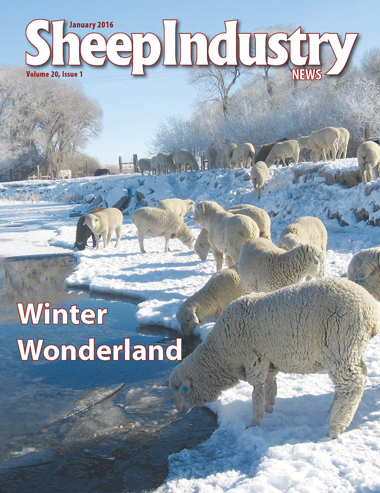Networking with the Next Generation
KYLE PARTAIN
Sheep Industry News Editor
Starting on page 16 of this issue you will find a story about Josh Kitzan and his parents, Dwight and Gwendolyn, and their investment in establishing the South African Meat Merino breed in the United States.
I first met Josh when we ended up at the same dinner table during the National Lamb Feeders Association’s Howard Wyman Leadership School back in June. Like any sheep producer, he talked up the merits of his chosen breed to anyone willing to listen.
He was such a good salesman that he hooked three of us at the table that night. I ended up at his family’s place near Nisland, S.D., a few months later for the story that appears in this issue. The other two he reeled in that evening were Iowa producers Reuben and Nikki Sprung, who were also students at the leadership school. I noticed that they purchased a Kitzan ram just a month later at the Center of the Nation National Sheep Improvement Program Sale in Spencer, Iowa.
Two things jump out at me from this story.
The first is the importance of networking, even in a relatively small industry such as sheep production. And the best place to do that is at industry conferences, schools and sales.
Being new to the industry this past summer, the leadership school provided me with an opportunity to learn an awful lot about sheep in a concentrated, two-day seminar. It also provided me with an opportunity to meet industry leaders (both current and future) face-to-face.
I walked away from the school with countless story ideas – some of which have since appeared in the magazine, like the Kitzan story in this issue. But sheep producers walked away with valuable ideas on a number of topics. You could almost see the wheels turning in their heads during conversations both in and out of the classroom. Every five-minute conversation during classroom breaks, every meal, every bus ride between tour stops provided a learning opportunity.
Those headed to ASI’s Annual Convention in Scottsdale, Ariz., this month will experience this phenomenon first hand. Sure there will be decisions to be made and policy suggestions to sort through, but there will also be those moments when lightening will strike. Ideas on the industry and ways to improve your own operation – from sheep production to wool classing and everything in between – could pop up at any given moment. Whether it’s a question-and-answer session on the new veterinary feed directive (see page 12) or a late-night conversation in the bar, you never know when you might learn something that will make life easier, more fun and more profitable.
The second aspect of the leadership school that strikes me even more now than it did then is the involvement of younger producers. At 42, I was the oldest one sitting at the table that night as the merits of the South American Meat Merino were discussed.
The fact that three 20-somethings were sitting around a table discussing the sheep industry is a good thing. Look no further than Harold Harper’s obituary on page 10 of this issue and it’s easy to see that we need the next generation to start stepping into these leadership roles.
More importantly, we need them to learn all they can from men like Harold before it’s too late. Then they can take that information and apply it with a modern twist to keep the sheep industry alive in this country.
I’m thankful for the youth programs that I see working at the state level. For instance, a ewe donated by Betty Sampsel in Montana was sold seven times and raised $3,850 last year to help pay expenses for next generation producers to attend the Young Entrepreneurs meeting that will take place during the annual convention.
A handful of states offer starter flock programs in an effort to hook the younger generation into a lifetime of sheep production. Programs like this are just as important to the future of the industry as those being funded through our second round of Let’s Grow grants (see page 22).
Speaking Let’s Grow, there’s some important work being done there, as well. Providing grant dollars to programs that will improve everything from lamb production and shearing to wool quality is an essential aspect in strengthening this industry for the years to come.
With all that in mind, there’s no reason why you should still be on the fence about attending the annual convention. Hurry up and send in your registration today. I guarantee you won’t regret it.


